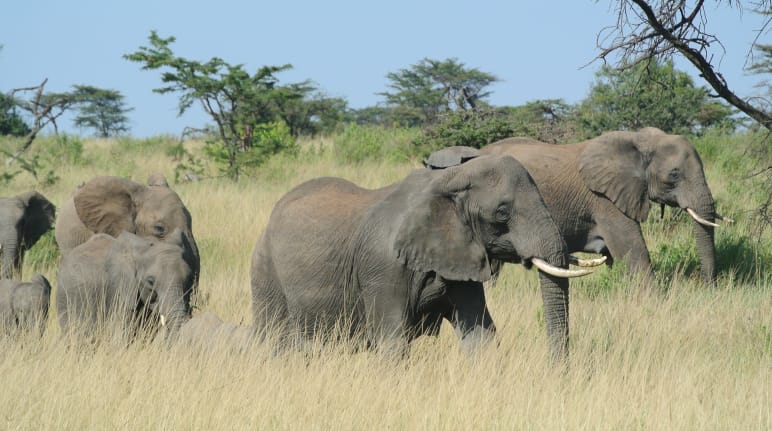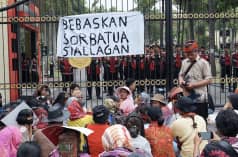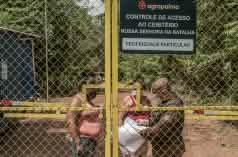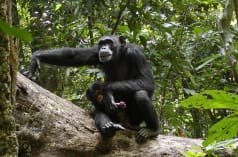World Bank: Stop financing evictions and human rights abuses in Tanzania!
 Yes to conservation, but not at the price of murder and mayhem against local communities. (© Rettet den Regenwald / Mathias Rittgerott)
Yes to conservation, but not at the price of murder and mayhem against local communities. (© Rettet den Regenwald / Mathias Rittgerott)
Tanzania’s government plans to evict over 20,000 people under the pretext of conservation by doubling the size of Ruaha National Park. The World Bank is enabling this move, which will trample the rights of Indigenous people and local villagers. The World Bank is a taxpayer-funded body – so it’s up to us to end its complicity.
Call to actionTo: the President of the World Bank, Ajay Banga
“The World Bank must stop financing the REGROW project that is enabling the eviction of over 20,000 people and financing rangers accused of human rights abuses.”
The World Bank is financing a project in Tanzania that purports to protect the environment but has been linked to grave human rights violations: In its latest report, Unaccountable & Complicit, Oakland Institute blames the Bank, which is taxpayer-funded, of “enabling” evictions, rapes and murders.
Ruaha National Park is at the center of the scandal. The protected area in the geographical heart of Tanzania is home to many millions of savannah animals, from antelopes to zebras, and is a hotspot for birds – numerous white storks from Europe migrate there for the winter.
To boost tourism, the government plans to double the size of the park from one to over two million hectares and increase the number of park rangers. The $150 million REGROW program of the World Bank is financing this project. In October 2022, Minister Angeline Mabula announced the evictions of more than 20,000 people in connection with the expansion.
The REGROW project is not about protecting wildlife or conservation. Instead, the Bank is financing an oppressive and violent economic growth model based on boosting tourism revenues.”
- Anuradha Mittal, Executive Director of the Oakland Institute
According to Oakland Institute, local people accuse Bank-funded park rangers of murder, sexual violence and other brutal assaults. Large numbers of cattle are being seized an effort to destroy the livelihoods of villagers.
This strategy of violence and eviction is nothing new for Tanzania’s Indigenous peoples: More than 100,000 Maasai are fighting for their land and livelihoods at the Ngorongoro Crater and near the Serengeti.
Two villagers have submitted a complaint to the World Bank on behalf of their communities and 852 villagers filed a case at the High Court of Tanzania at Mbeya.
Please sign our petition and tell the World Bank to end its complicity in human rights abuses and evictions now.
BackgroundIn a press release dated September 28, 2023, Oakland Institute Executive Director Anuradha Mittal states: “REGROW project is not about protecting wildlife or conservation. Instead, the Bank is financing an oppressive and violent economic growth model based on boosting tourism revenues. Amidst widespread international condemnation of forced evictions of the Maasai in Ngorongoro and Loliondo, it is stunning for the Bank to be complicit in serious human rights abuses through its support for the expansion of another national park for tourism.”
Problems with the expansion of protected areas
Environmentalists and human rights activists worldwide fear a sharp increase in land grabbing under the pretext of nature conservation: During the UN Biodiversity Summit COP 15 in Montréal in December 2022, nearly 200 countries agreed to officially place 30 percent of their lands and waters under protection by 2030. This is commonly referred to as “30 by 30”.
Up to 300 million people could lose their land and livelihoods as a result. However, the indiscriminate expansion of protected areas will not stop environmental degradation or halt the mass extinction of species.
Together with numerous partner organizations, Rainforest Rescue launched the petition “A better way to protect biodiversity: strengthening indigenous rights!” to draw attention to the danger.
The responses of the World Bank
In its response to the accusations, the Bank stated that its mandate “does not extend to overseeing the conduct of Member countries’ government agencies or to intervening in the event of alleged wrongdoing unrelated to a World Bank-financed project.”
Furthermore, “To the extent that the government is pursuing evictions for purposes of extending park boundaries, such activities would fall outside the scope of the Project.”
Regarding the allegations of violent acts by rangers, the World Bank writes that it does not finance weapons, and that crimes such as extrajudicial killings must be reported to the authorities. The Bank is thus ignoring the fact that state security forces are involved in acts of violence such as those in Loliondo against the Maasai.
Quotes from villagers
The Oakland Institute quotes a villager as saying:
“People living in Mbarali are suffering very much from RUNAPA armed rangers. They treat them with cruelty, including killings, with no proper reason. No steps have been taken by the government. There is no rule of law. The land of the farmers and pastoralists is taken by RUNAPA and we are forced to leave our ancestral land. The communities of Mbarali, if steps are not taken, will fall into poverty, which was not the intention of the REGROW project.”
The Guardian quotes a local community leader:
“Many farmers were barred from cultivating their farms this year causing hunger and poverty. Many of the residents of the villages in question face an uncertain future and psychological pain. ... I want the World Bank to immediately halt the project and conduct forensic investigation on the allegations of gross violation of human rights in the project area.”
First consequences for local people
According to Oakland Institute, the threat of eviction is already having an impact on people’s everyday lives. Large parts of the rice fields were not tilled because the eviction could take place before the harvest. In several villages, houses have already been marked for demolition. Construction work on a secondary school in the village of Luhanga has been halted. In the village of Iyala, the number of students transferring from primary to secondary school has dropped dramatically. Because of the threat of eviction, parents have stopped sending their children to school.
Tourism
Tourism is one of the most important economic sectors and foreign exchange earners for Tanzania.
The government’s plan to boost tourism was founded on, among other things, a January 2014 World Bank study highlighting the country’s untapped potential. Instead of one million visitors in 2013, there could be eight million tourists annually by 2025. Tanzania’s government is now apparently targeting tourists from China, India and Russia in particular.
The REGROW program
REGROW was launched in 2017 and is scheduled to last eight years. The funding program is intended to “improve management of natural resources and tourism assets in priority areas of Southern Tanzania and to increase access to alternative livelihood activities for targeted communities.”
The project focuses on four protected areas: Mikumi National Park, Nyerere National Park, Udzungwa Mountains National Park and Ruaha National Park.
Of the slated $150 million, $106 million will be used to develop infrastructure in the protected areas, such as building roads to improve access to viewpoints, airstrips and visitor centers. In addition, money was provided for the construction of seven security posts and equipment for rangers. The objective is to enable security forces to prevent “illegal” use of resources, including agriculture and pastoralism.
$11.5 million has been earmarked for alternative livelihoods for local people. Several thousand households are to be made fit to work in tourism, for example as safari guides, by producing and selling handicrafts and growing food for tourists. However, the project is far from those numbers.
As of October 2023, the World Bank had provided $92 million. $28 million of this was disbursed after the official complaint from villagers was received in June 2023.
Ruaha National Park
The area of today’s national park was designated as the Saba Game Reserve by the German colonial government in 1910. In 1946, it was renamed Rungwa Game Reserve by the then British colonial administration. With the establishment of what is now Tanzania in 1964, it was declared a national park.
The government claims the boundaries of RUNAPA have encompassed these villages since the Government Notice signed in 2008 and are therefore illegal. The locals dispute this because the expansion was never implemented and their consent was never obtained.
The Great Ruaha River basin has been referred to as Tanzania’s “ecological backbone”. The national park is home to one of the largest populations of elephants and lions in the country, as well as more than 570 species of birds. Leopards, cheetahs, hyenas, wild dogs, giraffes, buffaloes, zebras, warthogs and antelopes are also found in the area. Numerous hippos, Nile crocodiles and fish species live in the river.
Two hydropower plants were built in the Great Ruaha in the 1970s and 1980s. The river is also used to irrigate rice fields owned by large companies. The government is trying to expand hydropower, rice cultivation and tourism, even though the level of the river has dropped in recent years. The local population has been unfairly accused of being responsible for this decline.
Indigenous peoples
The Sangu, Sukuma and Maasai Indigenous peoples have lived in the region for generations.
The Sangu are considered the original inhabitants of the Ihefu wetland. They already grazed their cattle along the Great Ruaha in pre-colonial times.
To: the President of the World Bank, Ajay Banga
Dear Mr. Banga,
Disturbing information about the World Bank’s REGROW (Resilient Natural Resource Management for Tourism and Growth) project in Tanzania has come to light. According to the Oakland Institute report Unaccountable & Complicit, the Bank’s support for the Tanzanian government is directly linked to large-scale evictions and human rights abuses to expand Ruaha National Park (RUNAPA).
Although Bank documents state that the project will not result in resettlement, on October 25, 2022, the Ministry of Lands, Housing, and Human Settlements Development (MLHHSD) publicly announced that the government will forcibly evict over 20,000 local people in the area to facilitate RUNAPA’s expansion.
Villagers accuse REGROW-funded rangers of the national park authority TANAPA of murders and numerous acts of violence since the project began in 2017. The authorities are also confiscating and auctioning off cattle in large numbers, severely impacting the livelihoods of pastoralists. The violence and seizures are most likely conducted to force the pastoralists to abandon their land.
The Unaccountable & Complicit report documents how the Tanzanian government is violating World Bank operating procedures and safeguards by planning evictions without a formal relocation plan and without due process for consultation and compensation. The REGROW project team denied responsibility to Oakland Institute and took no action when informed of human rights violations. Continued inaction is unacceptable.
The Tanzanian government’s atrocities against its own people and its apparent disregard for the World Bank’s operating procedures and safeguards disqualify the country for financing in our eyes.
We urge you to stop further payments under REGROW and end the World Bank’s complicity at once.
Yours faithfully,
On paper, the government extended the boundaries of Ruaha National Park to over 2 million hectares (20,226 square kilometers, roughly the area of Wales or the US state of New Jersey) in 2008, but the decision was never implemented. The inhabitants of the legally registered villages never gave their free, prior and informed consent and remained in the area.
In its project document, the World Bank states 13,000 square kilometers as the size of Ruaha National Park.
Now the government is actually implementing the expansion of the park, and in October 2022 it announced plans to evict villages that are within the new boundaries.
REGROW programREGROW stands for “Resilient Natural Resource Management for Tourism and Growth”. Detailed information can be found on this project page of the World Bank website.
more than 20,000 peopleThe residents of the five villages of Luhanga, Madundasi, Msanga, Iyala and Kilambo near the Ruaha National Park will be evicted. 47 sub-villages from a further 14 villages will also be affected.
brutal assaultsThe Oakland Institute describes this in detail, starting on page 10 of its report.
destroy the livelihoodsGovernment agencies have been seizing cattle in large numbers. The enormous financial strain induced by these seizures undermines pastoralists’ livelihoods to force them out of the area. These actions contradict one supposed aim of the REGROW project, to strengthen livelihoods for local communities. The Peoples Dispatch has posted an article on the evictions and violence: “Tanzanian farmers are paying for ‘conservation’ with their land and lives”
The two villagers filed the complaint on behalf of their communities. For security reasons, they remain anonymous.
The detailed notice of registration can be found here.
This petition is also available in the following languages:
Help us reach 100,000:










